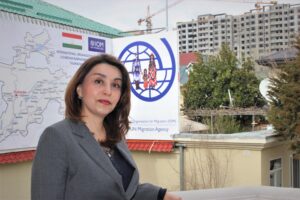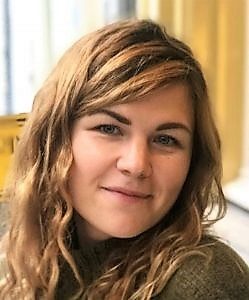PEAH is pleased to republish an article by AFEW partner organization. AFEW is dedicated to improving the health of key populations in society. With a focus on Eastern Europe and Central Asia, AFEW strives to promote health and increase access to prevention, treatment and care for major public health concerns such as HIV, TB, viral hepatitis, and sexual and reproductive health First published December 18, 2020
By Olga Shelevakho
More Funds Are Required To Promote Migrants’ Health
In December 2019, IOM (International Organization for Migration) Tajikistan together with AFEW International and AFEW Kyrgyzstan launched the project “Improving migrants’ access to HIV services in Tajikistan”. Aim of this project is to raise awareness among outgoing migrants on safe migration and to promote health seeking behaviour relating Sexually transmitted infections (STIs) and HIV through peer networks.
 Rukhshona Kurbonova, National Professional Officer, Sub-Regional Coordinator on Migration Health for Central Asian countries, talked to AFEW International about the outcome of the project, the challenges that the project faced during its 1-year implementation, and the important role of community representatives in the process.
Rukhshona Kurbonova, National Professional Officer, Sub-Regional Coordinator on Migration Health for Central Asian countries, talked to AFEW International about the outcome of the project, the challenges that the project faced during its 1-year implementation, and the important role of community representatives in the process.
Rukhshona, 2020 was not the easiest year, because of the Covid-19 pandemic. How has this affected the project “Improving migrants’ access to HIV services in Tajikistan”?
Indeed, 2020 became quite a difficult year for the world, also for us. We have managed to implement key activities, and tried our best to fully roll out the project, but have not had the reach that we hoped for, due to COVID-19. The main activity of the project was outreach work among outgoing migrants to raise awareness on prevention STIs and HIV and promoting health seeking behaviour. As a result of the project, the number of the migrants covered by HIV testing in Kulob increased 4 times. Although we referred less migrants for HIV testing than was planned, the results of the project demonstrated a positive impact on health seeking behaviour. The COVID19 situation hindered reaching the initial target of 1000. We have adapted to this situation by setting up a testing program at the Kulob AIDS Control Center, which will continue to provide free testing among migrants.
Talking more about COVID19, I would like to say that the pandemic also drew our attention to the needs of the migrants’ families. Many migrants abroad lost their jobs and could not send money to their families at home. This led to some precarious situation with the families left behind. IOM and AFEW responded to this by allocating funds for the support packages. As a result, 50 vulnerable migrants’ households received food packages and hygiene kits, including protective materials for COVID-19.
Did IOM Tajikistan or partner organizations face any other challenges?
One of the challenges was a process of implementing a new approach where we tried to identify high-risk behaviour among migrants during outreach work. This included asking them questions on drug use and sexual practice. This was a very sensitive issue, and particularly the questions about men having sex with men were met with a very negative response. It was very difficult to discuss these topics.
When we were organising safe migration training among migrants who use drugs, it became clear that active drug users need psychosocial support, rather than information on migration legislation. It means that safe migration training sessions need to be organized among people who use drugs in remission phase and in case they intend to go abroad for work.
 What is the main outcome of the project, from your point of view?
What is the main outcome of the project, from your point of view?
The main outcome of the project is that we piloted successfully our new approach on reaching key population among migrants and migrants with risk behaviour. Although we could not implement all activities in the way we would have wanted, it is clear that the suggested approach needs to be extended and applied in other projects.
Within the project, the IOM conducted operational research. What was the goal of this research and do you plan to use its results in the future?
The goal of the operational research was to measure the effectiveness and impact of the suggested project activities on the knowledge, attitude and practice relating STIs and HIV of migrants, including key populations. Due to COVID19, we could not conduct all sessions that were foreseen, but nonetheless we collected valuable data about attitude and behaviour among migrants through base line survey and focus group discussions. This information gave us more understanding of the vulnerability among migrants, including a lack of knowledge and healthy practices among women in comparison with men and high stigma and discrimination toward men who have sex with men. Based on the received data, we plan to extend our research and develop scientific article next year.
 Did you involve community representatives into the project?
Did you involve community representatives into the project?
Community representatives played a key role in the project implementation. The outreach work was led by NGO “Nakukor”, who involved leaders of key population groups, including people living with HIV. A “peer to peer” approach was used, and community leaders and local migration and health authorities also helped in identifying the vulnerable migrants’ families and distributing food and hygiene packages.
In the end of November the online regional dialogue “Migrants’ Access To Essential HIV Services: Progress And Opportunities Amid COVID-19” was organized. What are the main insights of the event?
The event was organized jointly with WHO office in Europe and WHO Tajikistan. WHO colleagues helped us to bring Russian health authorities- representatives of Rospotrebnadzor – into this dialogue. As a result, the event gathered key stakeholders from the country of destination and countries of origin of migrants. Participation of the HIV service organizations extended the dialogue and gave opportunity to ask questions directly to each other. NGOs raised the issue of the lack of access of migrants with HIV to ART: Russian legislation prohibits residency of foreigners with HIV, and this means that ART is not available for migrants with HIV. The Healthcare Committee of the CIS is now developing a model HIV legislation which might change the situation in the future. The event demonstrated that regional meetings need to be organized on a regular basis to share updates and developments on migration and HIV.
Which results are you personally proud of?
Despite the limitations because of COVID19, the IOM, with AFEW and national partners, was able to conduct a number of activities reaching key populations among migrants, providing free HIV tests, collect data, organize a regional on-line event, develop two new brochures: on safe migration, the first brochure in Tajikistan that targets migrants who use drugs, and a brochure on prevention of sexually transmitted infection and HIV among migrants. The achievements and lessons learnt gave us the basis for the developing other new projects that will target key population among migrants.
 Do you see any challenges in the future for your projects and your help to migrants?
Do you see any challenges in the future for your projects and your help to migrants?
Unfortunately, there is lack of recognition of the contributions that migrants make both to the economics of the countries of origin and destination. It also needs to be recognised that the health of migrants is a key point for their performance. More funds are required to promote migrants’ health and advocate migrants’ rights to health. Inclusive policies, as part of the framework of universal access to health, are of great importance. More efforts need to be applied to extend cross-border cooperation between countries of origin, transit and destination.
In some countries of the EECA region, HIV and TB national programmes heavily depend on the support of international donors. AFEW International is one of the few organizations that specifically target migrants in their programmes in Eastern Europe and Central Asia. Labour migration is a long-term trend in the EECA region that significantly contributes to economics of the countries. In this regard, health of migrants is a fundamental condition for productive work and the social and economic development of the countries of origin and destination. Joint efforts and international support are highly required to address migrants’ needs in health.
